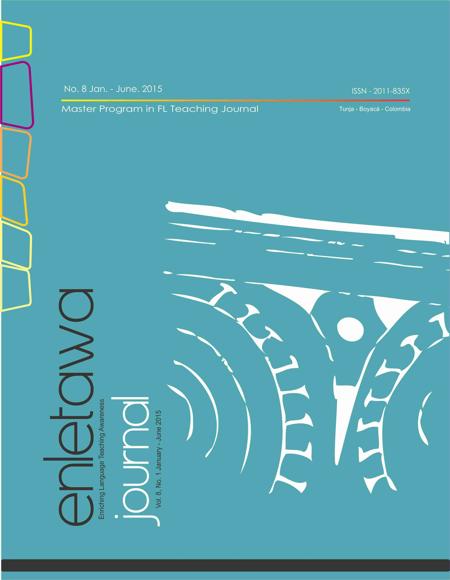Blogging as an EFL Practice Beyond The Classroom

Abstract
This small research project aims to explore how the use of a blog can benefit students’
learning processes in a rural school. Materials such as texts, videos, and even links for connecting with other similar sites were provided to students in order to employ blogs as a language exposure platform for
English learning. Data was collected by means of students’ narratives (opinions) regarding their use of the blogs and informal observation of students’ engagement in the process andof their artifacts. As a result,
findings indicate that the use of blogs became a useful aid to support language learning due to the contact participants established with the foreign language in the learning process, incidentally blogging enhanced students’ participation and interest in their own learning
References
- Aljumah, F. H. (2012). Saudi learner perceptions and attitudes towards the use of blogs in teaching English writing course for EFL Majors at Qassim University. English Language Teaching,
- (1), p100.
- Auerbach, C.&Silverstetin, L. (2003). Qualitative data. An introduction to coding and analysis: Coding the mechanics (31-76). New York: New York Unviersity Press.
- Ausubel, Novak-H. (1983).Psicología educativa; Un punto de vista cognositivo. México:Trillas.
- Beer, c, Clark, k. and Jones, D. (2010, p.76). Indicators of engagement. Ascilite Sydney. Retrieved from: http:/ascilite.org.
- au/conferences/sydney10/procs/Beerfull. pdf.
- Campbell, A.P. (2003). Weblogs for use with ESL classes. The Internet TESL Journal, 9 (2), 1-3. Retrieved from: http:/iteslj.org/Techniques/Campbell-Weblogs.htmal.
- Cuesta L. (2010). The Design and development of online course materials: Some features and recommendations. Profile Issues in Teacher Professional Development.12(1),182-189.
- Dieu, B. (2004). Practice view: Blogs for language learning. Tesol EssentialTeacher, 1(4), 26-30.
- Fageeh, A. I. (2011). EFL learners use of blogging for developing writing skills and enhanced attitudes towards English
- learning: An explorative study. Journal of Language and Literature,2(1), 32-33.
- Gros, B., & Silva, J. (2005). La formación del profesorado como docentes en los espacios virtuales de aprendizaje.
- Revista iberoamericana de educación, 36(1), 1-13.
- Harwood, C. (2010). Using blogs to practice grammar editing skills. English Language Teaching World Online, 2, 1-13.
- Higgins, J.G. (2009) Language Exposure-The Easy Way to Learn Spanish. Ezine@rticles.Retrieved from: http://e z i n e a r t i c l e s . c o m /?expert=Jonathan_g_Higgins.
- Ismail, J. (1991). Language exposure and second language learning. The English Teacher, 20, 20-31.
- McMillan, J.(2001). Research in Education. A Conceptual Introduction. New York: Longman.
- Merriam, S. (2009). Qualitative Research: A guide to design and implementation. Jossey-Bass.
- McLeod, S.A. (2007). Lev Vigotsky. Retrived from: http://www.simplypsychology.org/vygotsky.html.
- Nguyen, L. V. (2008). Technology-enhanced EFL syllabus design and materials development. English Language Teaching, 1(2), 135-139.
- Taylor, E., Powell & Marcus, R. (2003).Analyzing Qualitative Data. Program Development and Evaluation. University of Wisconsin_Cooperative extension Madison Wisconsin. Retrieved from:
- http://learningstore.uwexedu/assets/pdfs/g3658_12.
- Wu, C. (2006). Blogs in TEFL: A New Promising Vehicle. Online Submission, 3(5), 69-73.
- Zhang, D. (2009). The application of blog in English writing. Journal of Cambridge studies, 4(1), 64-72.